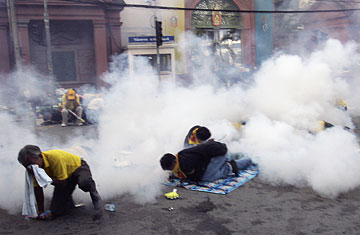
Anti-government protesters in tear gas smoke in front of parliament in Bangkok, Thailand, on Oct. 7
It was, said a leader of Thailand's anti-government protest movement, the "final battle." On one side, the People's Alliance for Democracy (PAD), a hodgepodge group of demonstrators that has occupied Government House, Thailand's seat of power, since late August, forcing newly elected Prime Minister Somchai Wongsawat to work out of the VIP lounge of Bangkok's old airport. Pitted against the PAD are those associated with former Prime Minister Thaksin Shinawatra, who was ousted in a military coup in 2006. On the evening of Oct. 6, members of the PAD swarmed the streets around parliament in what they called their ultimate mission: stopping Somchai, who is Thaksin's brother-in-law, from delivering an inaugural policy address. Until a Prime Minister and his cabinet speak before the legislature, they cannot exercise their powers. No speech, no official government action.
By the early morning of Oct. 7, a political standoff that has gripped Thailand for a month and a half erupted in a blaze of smoke. Riot police fired tear gas at the protesters gathered near parliament, and medical staff later reported that more than 100 people were injured. This included two protesters who had parts of their legs blown off by what police said were exploding tear gas canisters. A police spokesman said the action was taken to clear a road to parliament for cabinet members to attend Somchai's speech later in the day. A few days earlier, the PAD's leadership had also taken a hit when two of its founders were arrested and charged with insurrection and inciting unrest. One of those detained was PAD cofounder Chamlong Srimuang, an elderly retired general who later refashioned himself as a Buddhist ascetic.
The PAD — which counts among its members an eclectic group of unionists, businessmen and royalists — says it will keep fighting the government until it flushes out all representatives linked with Thaksin. The opposition alliance believes that the former billionaire tycoon-turned-P.M. was corrupt and manipulated a democratic system to entrench his own power. Thai courts have charged Thaksin with graft in several cases. On Oct. 6, an official from the British Home Office confirmed that Thaksin and his wife had applied for political asylum in Britain on the grounds that they will not receive fair trials back home.
After the volleys of tear gas cleared, members of the PAD regrouped around parliament and Government House, still vowing to keep up their protests. But six weeks of an opposition siege have left many Thais weary of the prolonged anti-government action. The country's stock market continues to swoon, with the benchmark index down nearly 40% since the PAD began its protest movement in late May. At a time when the government should be focusing on insulating the country from the global financial crisis, it is instead dealing with a clutch of protesters who want to replace a one-man-one-vote system with one in which representatives from different professional groups help elect the country's leaders.
The PAD claims that the uneducated state of rural voters, who handed Thaksin and his successors large electoral mandates, makes them vulnerable to electoral fraud. But vote buying doesn't wholly explain the appeal of populist politicians like Thaksin, who promised villagers health-care benefits and microfinancing options. If elections were held tomorrow, the governing coalition led by the People Power Party, which is packed with Thaksin acolytes, would likely win support again. The final battle, as that one PAD leader calls it, isn't over yet.
